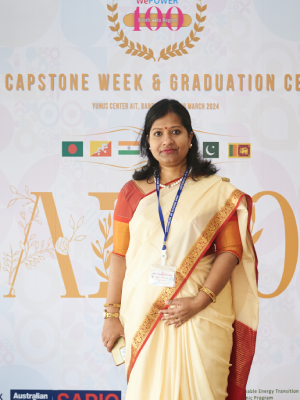For Riddhi Prasad, the SAR100 training course couldn't have come at a better time in her career.
For the past decade or so, she's worked in a variety of roles with India's Damodar Valley Corporation (DVC), a utilities body headquartered in Kolkata.
"I'm actually an electrical engineer, and was initially posted in a thermal power plant for four years. Then I was transferred and posted to the DVC corporate office in IT, and also worked in contract management for eight years. I haven't worked in the field for some time, so there were wide gaps in my technical knowledge and exposure to power plants," explains Riddhi.
Thanks to the WePOWER SAR100 training program, all of that has now changed.
Running from 2023-2024, and delivered by the Bangkok-based Asian Institute of Technology (AIT), SAR100 brought together 101 impressive South Asian female engineers from across Bangladesh, Bhutan, India, Maldives, Nepal, Pakistan and Sri Lanka, for 8-months of learning, networking, and collaboration.
The course and its final capstone week in March (held in Bangkok) were made possible through the AU $32 million South Asia Regional Infrastructure Connectivity (SARIC) Program, which is funded by the Australian Government and implemented by Palladium alongside the World Bank and the International Finance Corporation.
"The program heightened my potential, and fostered a community of empowered women," says Riddhi proudly. "I got motivation and inspiration from the success of the other top women leaders doing SAR100."
Fittingly, her group research project focused on leadership and gender equality in the energy sector. Alongside her SAR100 peers, she took everything she could from the 10 modules, the countless lectures, and the expertise of her tutors and professors.
Indeed, back home, India continues to accelerate its energy transition journey, with ambitious targets, increasing deployment of renewable energy, the tightening of environmental pollution norms, and the adoption of critical technology. As the country continues to shape a sustainable future, engineers like Riddhi are sure to play a key role.
"The whole world is moving towards sustainable energy transitions, and becoming carbon net zero," she adds.
Technical skills aside, Riddhi will also be forever grateful for the networking opportunities SAR100 gave her.
"I built my network with energy scholars from seven countries, and familiarized myself with diverse inter-regional working and social cultures," she explains. "I have become an extrovert, due to the networking with these energy sector women."
As for the future? Riddhi is optimistic.
"I am empowered to make decisions now, and will pursue senior positions in my organisation!"

